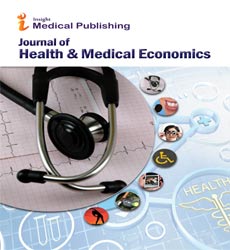A New Economic Environment for Practicing Rheumatologists
Dickson *
Department of Human and Organization Development, Peabody College Vanderbilt University, Nashville, USA
- *Corresponding Author:
- Dickson
Department of Human and Organization Development, Peabody College Vanderbilt University, Nashville, USA
E-mail: Dickson@gmail.com
Received date: October 26, 2022, Manuscript No. IPJHME-22-14917; Editor assigned date: October 28, 2022, PreQC No. IPJHME-22-14917(PQ); Reviewed date: November 08, 2022, QC No IPJHME-22-14917; Revised date: November 21, 2022, Manuscript No. IPJHME-22-14917 (R); Published date: November 28, 2022, DOI: 10.36648/2471-9927.8.6.82
Citation: Dickson (2022) A New Economic Environment for Practicing Rheumatologists. J Health Med Econ Vol. 8 No.6:82
Description
In order to investigate questions in development economics, behavioral development economics incorporates concepts and theories from psychology and behavioral economics. We begin by looking at a major development economics puzzle: The "Euler equation puzzle" refers to the fact that there are high rates of return without correspondingly rapid growth. We talk about how much loss aversion and present bias can help solve this problem. Following that, we take a look at a number of development-related topics, such as insurance, savings, and adoption of technology, labor markets, and businesses. We describe the existing empirical evidence and talk about specific behavioral theories that can help explain some of the most important facts in each literature. Non-standard beliefs (naiveté and non-Bayesian learning), non-standard decision-making (limited attention and memory, mental accounting, and default effects), and non-standard preferences (present bias, loss aversion, and social preferences) are among the behavioral topics discussed. We argue that “behavioral firms" in developing countries represent a promising new research focus because firms in developing countries are more likely to deviate from profit maximization. We also talk about recent research that says social preference variation is a big factor in development, may have deep historical roots, and may also respond to policies. The emerging body of research on the psychology of poverty, which contends that living in poverty itself, may have a causal impact on cognitive function, decision-making, and productivity, is then described.
Anthropogenic
There is intense debate in the field of economics. Scholars who take a broader and more critical view of current economic models have described the flaws of orthodox economic theory and the severe consequences of its systemic discounting of the environment in response to the intersecting challenges of the Anthropogenic. Neoclassical and neoliberal economics, according to heterodox economists, ignore the needs and interests of women, workers, and other historically disadvantaged groups. At the intersection of economics and design, investigations into the household, the state, and the commons as alternative economies provide a space for incorporating and valuing the ecological context's provisioning services and the undervalued work of particular groups. Economists, social and cultural theorists, anthropologists, and design theorists all use methods that show how the priorities (or notions of value) embedded in the systems that determine what is designed are what determine sustainable and socially just futures. By conceptualizing, modeling, mapping, framing, and other future manufacturing practices, design can contribute to economic transitions with these concepts. The foundation for societal responses to climate change on a scale that has the potential to make a difference is heterodox, ecologically engaged economics. The relationship between a patient and the public or private payer, which either reimburses the physician or hospital or pays for the prescribed medication, is the subject of this discussion. To borrow a phrase, "those with the gold make the rules." The payer sets the rules by using premiums paid by a group of people and taking on financial responsibility for that group's health care costs. Millions of people's lives have been made better and a new economic environment for practicing rheumatologists has emerged as a result of the development of biologics for the treatment of rheumatologic diseases. The economics of pharmaceutical innovation, research and development, and ultimately product pricing are beyond the scope of this article or issue. It is sufficient to acknowledge that innovative businesses expect returns proportional to the risk when conducting fundamental research and development. The space industry is currently experiencing the emergence of a commercialization paradigm as a result of recent changes in the aerospace sector's structure and relationship to government. The novel market segments of space research and exploration, the utilization of space resources, and human access to space may soon be accessible to private space endeavors, which could further encourage the development of a new space economy.
Backward Contamination
As a result, the multidisciplinary field of planetary protection must keep up with these developments to avoid unnecessary complications that could impede the beneficial resurgence of space-related economic interest. The term "planetary protection" refers to a set of guidelines that aim to stop Earth-borne biological material from contaminating celestial bodies in the forward direction and extraterrestrial biological material from contaminating the terrestrial biosphere in the reverse direction. The public's perception of a so-called "Mars Race" is currently being formed by multiple private entities possessing the technical capabilities for space access, which raises significant concerns regarding potential forward and backward contamination issues. This work frames an ecological financial matters way to deal with in reverse tainting. Backward contamination risks may specifically arise from commercial activities on Mars that necessitate the return of people, goods, vehicles, or other equipment to Earth, such as the potential business cases of commercial sample return and Mars tourism. Even though these activities don't seem to be a real threat to planet protection right now, it would be wise to think about them when making policies. It is anticipated that Earth-return missions from Mars will pique a worldwide public interest in the environmental, health, and safety risks associated with a possible backward contamination incident.
Open Access Journals
- Aquaculture & Veterinary Science
- Chemistry & Chemical Sciences
- Clinical Sciences
- Engineering
- General Science
- Genetics & Molecular Biology
- Health Care & Nursing
- Immunology & Microbiology
- Materials Science
- Mathematics & Physics
- Medical Sciences
- Neurology & Psychiatry
- Oncology & Cancer Science
- Pharmaceutical Sciences
